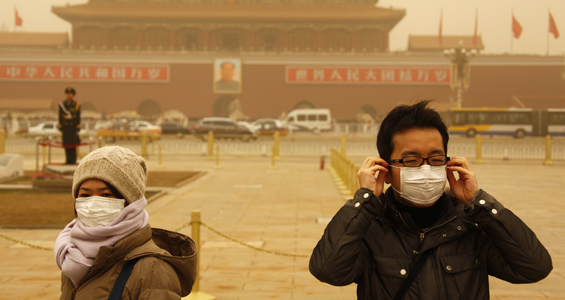Health alert over China sandstorm
Residents urged to stay indoors as storm sweeps large swathe of northern China.

 |
| A weekend sandstorm blanketed much of Beijing in a fine yellow dust [Reuters] |
Meteorological officials in China have warned residents across a broad swathe of the north of the country to avoid going outside as an ongoing sandstorm swept across the area.
The storm, which first hit northeastern China on Saturday, has blanketed large areas in a fine yellow dust, forcing residents to cover their faces with masks and scarves.
Keep reading
list of 4 itemsTurtles swimming to extinction in Malaysia as male hatchlings feel heat
Could shipping containers be the answer to Ghana’s housing crisis?
Thousands protest against over-tourism in Spain’s Canary Islands
In the capital, Beijing, on Sunday authorities issued a rare level five pollution warning, signalling hazardous conditions, and urging residents to stay indoors.
The storm continued to cast a pall over the city on Monday, cloaking the capital’s skyscrapers in a greyish mix of sand, dust and pollution.
 |
| The sandstorms are mainly attributed to prolonged drought in northern China [Reuters] |
Sandstorms have become increasingly common in arid northern China, which scientists say are caused by a combination of deforestation, prolonged drought and a resulting increase in desertification.
Four years ago, a sandstorm dumped at least 300,000 tonnes of sand on Beijing.
China has 2.6 million square kilometres of desert, an area nearly 2.5 times the country’s total farmland, according to government statistics.
The storms in the north come as residents in China’s southwest face what officials say is the worst drought seen in at least 60 years.
Since late last year, the provinces of Yunnan, Sichuan and Guizhou, have received only half their annual average rainfall, leaving at least 16 million people with severely depleted water supplies.
More than four million hectares of land were affected causing economic losses amounting to nearly $2.8bn
China’s state-run Xinhua news agency said around 4,000 troops had been deployed to the region to help distribute emergency water supplies.
Forecasters meanwhile have said there is no sign of significant rainfall coming in the short term.
Over the weekend China’s premier, Wen Jiabao, visited the region and called for united efforts to combat what he called an “extraordinary disaster”.